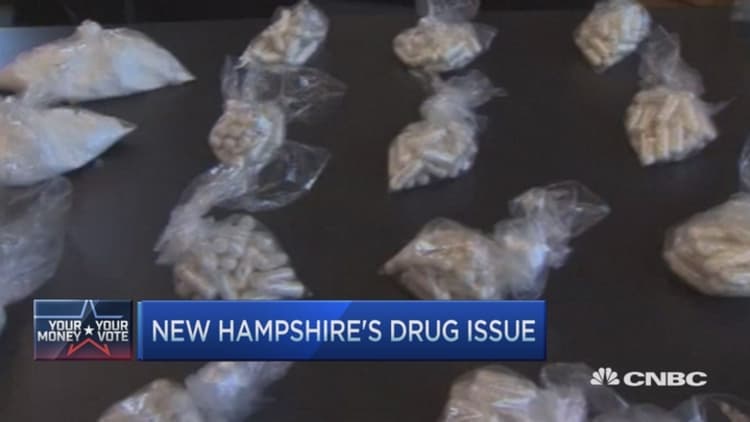
As New Hampshire voters go to the polls, the No. 1 issue on their minds may surprise you.
One-quarter of New Hampshire adults believe that drug abuse is the most important problem facing the state, according to the most recent WMUR Granite State Poll conducted by the University of New Hampshire Survey Center. It is the first time since 2008 that New Hampshire residents cited something other than jobs and the economy as the No. 1 state issue. Drugs also topped taxes, health care, education and the state budget as issues of concern for New Hampshire residents.
Fears of drug overdose in the small state have soared as a record number of opioid-linked deaths have occurred in New Hampshire, with about one person each day dying as a result of heroin or painkiller overdose. The survey results show how widely the drug issue has cut across the state's population in a short period of time.
As recently as February 2013, no New Hampshire residents had cited the drug issue as the state's "most important." But in the past year alone, the percentage of residents who ranked the issue as the "most important" grew from 4 percent (February 2015) to 25 percent (October 2015).
"Jobs/economy" was down to 21 percent in the most recent survey.
Senator Jeanne Shaheen (D-New Hampshire), told CNBC that she's not surprised to hear people say this is the biggest issue on their minds, because it's ravaging families and hurting communities in her state.
"Obviously, there are huge costs. There are costs in terms of lost productivity from people who are not able to do their jobs because they're addicted. There's a huge cost in terms of families and the tragic loss they are experiencing. There's a huge cost, because we don't have enough treatment beds," Shaheen said.
In another sign of how rapidly the drug issue has risen to the top of the "most important" list for New Hampshire residents, drugs are the only issue other than jobs and the economy to hit double digits by percentage in two consecutive survey periods since 2011. Fourteen percent of New Hampshire residents cited drugs as the most important issue in the July 2015 survey.
The state's problem is a subset of a nationwide epidemic of drug abuse and addiction linked to opioids.
That addiction costs the U.S. economy more than $55 billion, with nearly half of that attributable to loss of workplace productivity.
Last year, President Obama asked for only about $133 million to deal with this problem. Last week, however, the president said he wants $1.1 billion to help fight the opioid epidemic.
According to the White House, most of that money would go to states to increase funding for treatment centers and providers.
States will receive funds based on the severity of the epidemic and on the strength of their strategy to respond to it, the White House stated.
Every candidate, Democrat and Republican, has at one point in his or her campaign brought up the issue of prescription painkiller abuse and overdose, with candidates like Carly Fiorina and Jeb Bush sharing personal family stories of coping with addiction.
It's the worst addiction epidemic in United States history, but it's also different in that this epidemic is disproportionately white, suburban and rural.Andrew Kolodnyexecutive director of Physicians for Responsible Opioid Prescribing
Executive director of Physicians for Responsible Opioid Prescribing, Andrew Kolodny, said that the epidemic began long before President Obama was in office, but during his tenure, there has been a drastic spiral downward.
"It wasn't until last year that his administration sought any increase in funding to address the opioid addiction epidemic," Kolodny said.
Kolodny says this addiction problem is a lot different than what we've seen in the past, such as in the 1970s, when the heroin addiction epidemic disproportionately hit low-income minority communities, similar to the crack cocaine issues of the late 1980s and early 1990s.
"This epidemic is much worse than anything we've ever seen before. It's the worst addiction epidemic in United States history, but it's also different in that this epidemic is disproportionately white, suburban and rural," Kolodny said.
Senator Shaheen said treating addiction begins with how one views the problem in the first place.
"One of the things I think we've begun to understand is that this is a disease, and we've gotta treat it like a disease."




